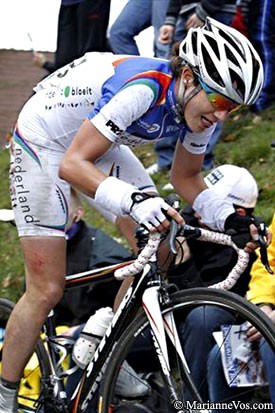Race official points finger at lack of UCI resources for anti-doping absence
 The organiser of the two Swedish World Cup races for women, the Open de Suède Vårgårda team time trial and road race, has responded to criticism from series leader Marianne Vos (Nedderland Bloeit) over the lack of anti-doping controls. The number one woman rider in the World made a number of criticisms over the low level of controls in the women’s sport in general to anti-doping pressure group Bike Pure.
The organiser of the two Swedish World Cup races for women, the Open de Suède Vårgårda team time trial and road race, has responded to criticism from series leader Marianne Vos (Nedderland Bloeit) over the lack of anti-doping controls. The number one woman rider in the World made a number of criticisms over the low level of controls in the women’s sport in general to anti-doping pressure group Bike Pure.
“In Sweden there was no doping control because the doctor was either ill, on holiday or there was some sort of miscommunication which can happen at times,” the Dutchwoman told Bike Pure. While Vos’ criticism was not levelled at the race organiser specifically, Race Manager Michael Anderson has felt the need to respond in an email to Danish magazine Cykelmagasinet:
“First I have to put a couple of things correct: The tests for our World Cup is a responsibility of UCI and not the national agency. Consequently any official comments are given by.
Also, in your original message you write “the lack of medical control at the Swedish races”, this is not correct. At the Team Time Trial on Friday we had complete test, following UCI format for this.
However, you are correct in the lack of tests after the Road Race.
The background for all this:
The appointed Anti Doping Control Officer from UCI was fallen ill and I was in contact with UCI officials about this several times before the race days. With very short notice UCI succeeded to find a replacement Anti Doping Control Officer for the Friday TTT-race but not for the Sunday Road Race. Therefore the tests could not be carried out. I know that UCI put in enormous efforts in finding replacements and they did a fantastic job finding one for Friday. I have read both your article and Marianne Vos statement on BikePure.
Also there I have a correction. It was the Anti Doping Control Officer being not available; the Anti Doping Doctor was there all the time. The organization has a female Med. Dr for this purpose and she was present from Friday until Sunday. To be able to do the tests, the doctor however is not enough, the AntiDoping officer must also be present.”
As Anderson explained, the issue appears to be one of resources within the UCI, in that there was no one available to cover for a sick anti-doping control officer. While this can be seen as unfortunate, it is perhaps also an indication of the standing that the women’s sport has within its governing body.
It’s hard to imagine the same thing happening in an equivalent men’s race, such as this Sunday’s Vattenfall Cyclassics.
Outside the World Championships, the World Cup races are the nine biggest events in the women’s calendar, in terms of prestige, ranking points and prize money. While an absence of anti-doping controls may be acceptable in certain circumstances at smaller races, with so much at stake in the World Cup though, the women surely deserve better.